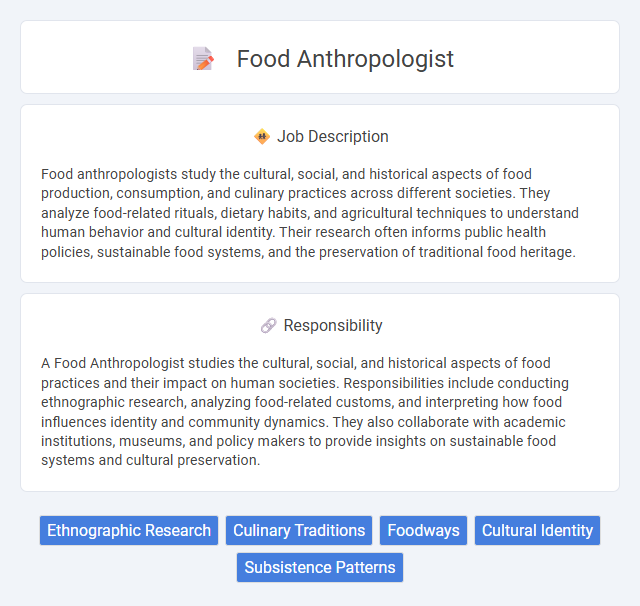
Food anthropologists study the cultural, social, and historical aspects of food production, consumption, and culinary practices across different societies. They analyze food-related rituals, dietary habits, and agricultural techniques to understand human behavior and cultural identity. Their research often informs public health policies, sustainable food systems, and the preservation of traditional food heritage.
Individuals with a strong curiosity about cultural diversity and a willingness to engage in field research may find a Food Anthropologist role suitable. Candidates who are comfortable with extended periods of travel and adapting to various social environments probably have a higher likelihood of thriving in this job. Those lacking patience for meticulous data collection or sensitivity to cultural nuances might face challenges in this career path.
Qualification
A Food Anthropologist requires a strong academic background, typically holding a master's or doctoral degree in anthropology, food studies, or a related field. Expertise in qualitative research methods, cultural analysis, and ethnographic fieldwork is essential for examining food habits and culinary practices across societies. Proficiency in interdisciplinary approaches, including history, sociology, and nutrition, enhances the ability to analyze the complex relationship between food, culture, and identity.
Responsibility
A Food Anthropologist studies the cultural, social, and historical aspects of food practices and their impact on human societies. Responsibilities include conducting ethnographic research, analyzing food-related customs, and interpreting how food influences identity and community dynamics. They also collaborate with academic institutions, museums, and policy makers to provide insights on sustainable food systems and cultural preservation.
Benefit
Food anthropologists likely gain valuable insights into cultural food practices that enhance understanding of human societies and dietary evolution. They probably enjoy opportunities to contribute to public health and nutrition policies by analyzing traditional food systems. Their expertise may also open career paths in academia, research, and global food sustainability initiatives.
Challenge
Food anthropologists likely face the challenge of navigating diverse cultural norms and dietary practices while conducting field research, requiring sensitivity and adaptability. They may encounter difficulties in accessing remote or isolated communities, which can limit data collection opportunities. The complexity of interpreting food-related behaviors within broader social, economic, and historical contexts might also pose significant analytical challenges.
Career Advancement
Food anthropologists can advance their careers by specializing in areas such as ethnobotany, nutritional anthropology, or culinary history, enhancing their expertise and marketability. Pursuing advanced degrees or certifications in anthropology or related fields often opens opportunities for research leadership, academic positions, or consulting roles with food and cultural organizations. Experience with interdisciplinary projects, fieldwork, and publications strengthens prospects for advancement in academia, museums, or global food policy institutions.
Key Terms
Ethnographic Research
Food anthropologists specialize in ethnographic research to explore the cultural, social, and historical contexts of food practices across diverse communities. They conduct immersive fieldwork, utilizing qualitative methods such as participant observation and interviews to document traditional foodways, culinary techniques, and dietary habits. This research informs broader understandings of identity, social structure, and cultural change related to food consumption and production.
Culinary Traditions
Food anthropologists study culinary traditions by examining the cultural, historical, and social contexts of food practices across different societies. They analyze food rituals, ingredients, and preparation methods to understand how culinary traditions shape identity and community cohesion. Their research often involves fieldwork, ethnographic studies, and collaboration with local food experts to preserve and document endangered food heritage.
Foodways
Food anthropologists study foodways by examining the cultural, social, and historical contexts of food production, preparation, and consumption across different communities. They analyze how food practices shape identities, social relationships, and environmental interactions, providing insights into traditions and innovations in culinary heritage. Their research contributes to broader understandings of globalization, sustainability, and health impacts linked to diverse dietary customs.
Cultural Identity
Food anthropologists study the relationship between food practices and cultural identity, analyzing how culinary traditions shape and reflect social values, beliefs, and community bonds. They examine indigenous diets, ritualistic food consumption, and migration's impact on cuisine to understand cultural continuity and transformation. This role requires expertise in ethnographic research, cultural theory, and historical foodways to interpret how food signifies identity across diverse populations.
Subsistence Patterns
Food anthropologists analyze subsistence patterns to understand how different societies obtain, process, and consume food, revealing the cultural, environmental, and economic factors that shape their dietary practices. They study foraging, horticulture, pastoralism, and agriculture as primary modes of subsistence, documenting how these strategies adapt to ecological constraints and social organization. This research enhances knowledge of human evolution, nutrition, and cultural diversity by linking food systems with identity and survival strategies.
 kuljobs.com
kuljobs.com